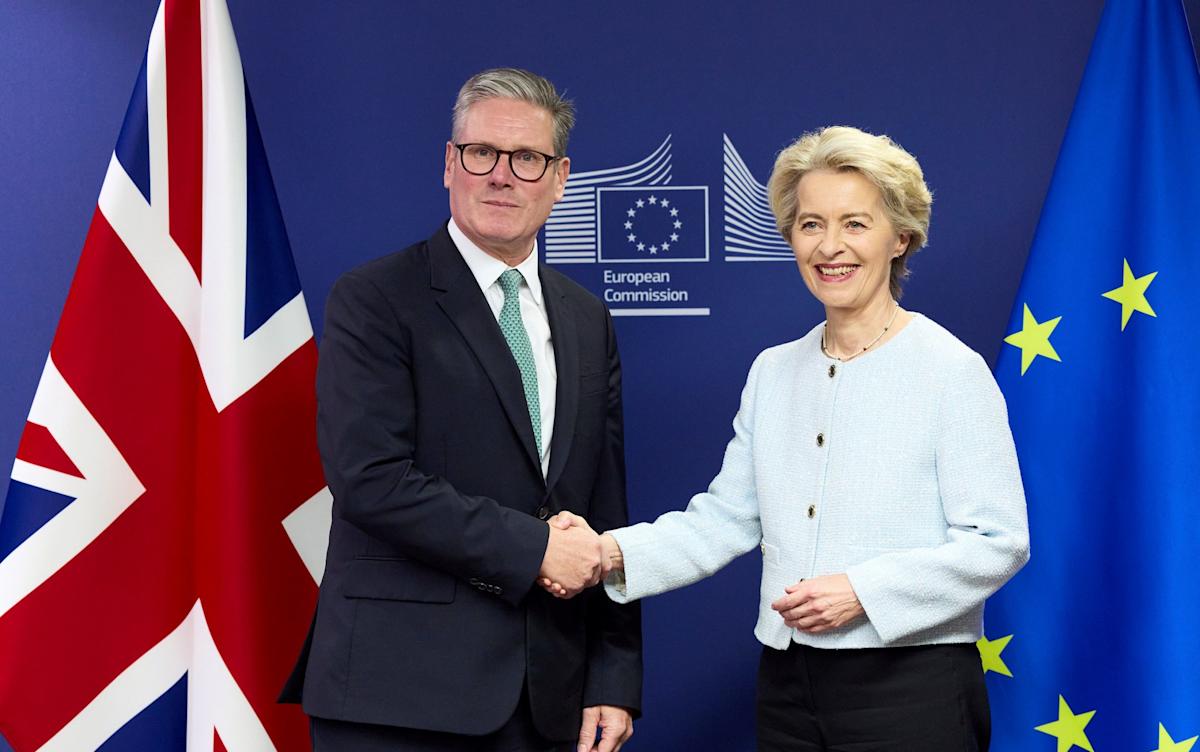
Keir Starmer has previously promised a reset of relations with Brussels – Benjamin Cremel /Getty
The European Union is threatening Britain’s steel industry with “existential” tariffs of up to 50pc just months after Sir Keir Starmer promised a reset of relations with Brussels.
On Tuesday, Brussels was preparing to impose swingeing taxes on all imports coming into the bloc, amid fears that a flood of cheap steel from Asia is crushing domestic industries.
However, British steel producers have warned they will also be hit by the crackdown, dealing a blow that risks being fatal for many companies.
This is because some 78pc of all Britain’s steel exports currently go to the EU – or around 1.9 million tonnes.
The dispute will be seen as an embarrassment for Starmer, who made major concessions on fishing and youth migration in May in his bid to improve post-Brexit relations with Brussels.
It could also deal another blow to the Prime Minister’s push to revitalise British industry, after the country’s steel and car makers were hammered by Donald Trump’s trade tariffs.
Brussels’ steel tariffs have the potential to deal far more damage than President Trump’s, with trade body UK Steel saying they could unleash “the biggest crisis the industry has ever faced” and risk being “terminal” for many companies.
In contrast to those sent to the EU, just 7pc of Britain’s steel exports are sent to the US.
The EU’s new “safeguarding measures” would impose tariffs of up to 50pc on various steel products imported from outside the bloc, once they exceed a quota set at 2013 levels, the Financial Times reported.
At the same time, British firms fear the prohibitively high tariffs will prompt foreign exporters to divert more of their steel to the UK – further undermining domestic industry.
Against this backdrop, Whitehall officials are scrambling to secure carve-outs for British companies.
Steel companies are also lobbying the Government to impose its own tougher restrictions on foreign imports from outside the EU.
Peter Brennan, of UK Steel, warned the plans would deliver a potentially “devastating hit” to producers.
He said: “These tariffs would be a massive problem for British steel companies at a time when they are already under a lot of pressure.
“If we cannot get our own quotas for what the EU is doing and cannot continue to export in similar volumes, it becomes an existential problem for the industry.”
Britain’s exports to the bloc should, in theory, be tariff-free under the post-Brexit free trade agreement.
However, Mr Brennan said that the deal allowed both sides to keep certain “safeguards” in place.
These quotas are imposed on how much of certain products can be imported from various countries before higher tariffs kick in. The system is highly complicated, and different quotas are imposed for each product and country individually.
The EU’s new tariffs are designed to tackle the flood of cheap steel coming out of Asia, and particularly China, which often benefits from subsidies.
A quarter of the EU’s steel demand is currently met by exports, compared to around 70pc in the UK.
The bloc’s tariffs will deal yet another blow to the UK steel industry, which is already struggling with high electricity prices and higher US tariffs.
Local steel producers have been grappling with tariffs of 25pc since President Trump raised them earlier this year.
Sir Keir has trumpeted this as lower than the 50pc taxes imposed on many other countries, but the Prime Minister has so far failed to keep his pledge to negotiate zero-rate tariffs.
The Government said it continued to “work closely with EU partners as we await the full details of these plans and their impact on UK businesses”.
Brussels is expected to unveil details of its proposals on Tuesday afternoon.
Disclaimer: This news has been automatically collected from the source link above. Our website does not create, edit, or publish the content. All information, statements, and opinions expressed belong solely to the original publisher. We are not responsible or liable for the accuracy, reliability, or completeness of any news, nor for any statements, views, or claims made in the content. All rights remain with the respective source.
